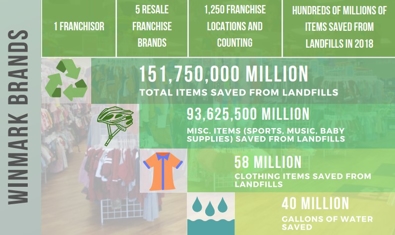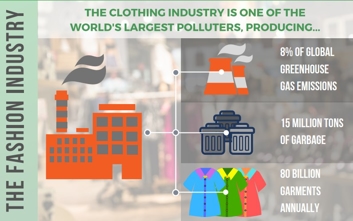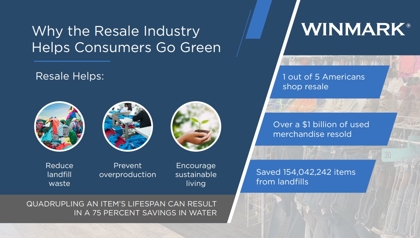Americans generate about 254 million tons of trash – with a national recycling rate of just 34 percent, according to the most recent data from the EPA. And the average American throws away approximately 80 pounds of used clothing annually, collectively producing more than 15 million tons of used textile waste each year.
Fortunately, many developments within the last decade – from awareness campaigns to municipal recycling projects – are slashing these numbers. And with the recent spike in the $17 billion clothing resale industry, it’s clear that being green is also good for business. Here are some collateral benefits of resale, aside from breathing new life into secondhand goods and keeping them out of landfills:
Cutting Down on Manufacturing Costs
Recycling textile materials reduces pollution from agriculture and production. Clothing manufacturers use as much as 713 gallons of water to make a single t-shirt. And growing crops, like cotton, wastes 60 percent of the water it requires – making clothing production extremely energy inefficient. Runoff from pesticides also pollutes nearby waterways, compounding any adverse environmental effects from excessive water usage.
Once manufacturers grow the raw items needed for textiles, producing the fabric in a factory releases pollutants like carbon dioxide and methane – contributing to high levels of fossil fuel emissions. Even clothing companies that claim to be environmentally friendly can inadvertently pollute if they don’t check the practices of their raw material suppliers or packagers. By recycling textile goods at resale stores, not only will you prevent them from prematurely ending up in landfills, you’ll also help reduce water pollution and waste from crops, as well as minimize factory emissions.

Eliminating Transportation Costs
Shipping accounts for roughly 17 percent of global carbon dioxide emissions. The transportation costs associated with retail goods – both for the environment and the consumer – quickly add up. With resale, these costs are reduced or eliminated, preventing harmful gases from entering the ozone. The lower cost of the recycled items also allows community members to buy things they might not be able to afford at retail value – since retail prices are inflated because of high shipping costs.

Creating Generations of Resourcefulness
Aside from resale’s myriad concrete benefits in minimizing waste and pollution, it also cultivates a culture of resourcefulness and appreciation for the environment. With the advent of “fast fashion,” many Americans place a higher value on accumulating more stuff than maintaining the well-being of the environment. By showing communities how recycling clothes and other used items benefits everyone, you can help curb wastefulness and promote a more sustainable way of life. This not only helps consumers develop a greater appreciation for the environment, but also encourages them to find other areas where they can reduce their environmental footprint.

Winmark’s resale concepts contribute to a healthier environment as we work toward a greener future. Not only do our clothing resale concepts keep hundreds of textiles from landfills, our other concepts – Music Go Round® and Play It Again Sports® – also keep a multitude of other products out of landfills as well.
Learn more about franchise opportunities with Winmark brands by filling out this short franchise form, and become part of the change that will help us become a healthier, more sustainable global community.

